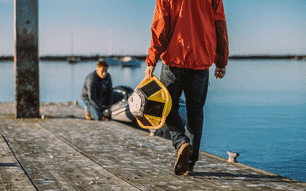The Fish-Aggregating Devices (FADs) consist of a floating buoy and "habitat mat" a few metres across. Plant life quickly grows under the mat, attracting large numbers of fish -- in essence creating new high-density fishing grounds where none existed before.
The 25 "fish magnets" will attract many different fish species, including tuna, that normally small-scale fishers cannot easily catch, making fishing more safe and efficient, while also encouraging fishers to switch their fishing efforts away from habitats such as coral reefs and sea grasses that are vulnerable to overfishing.
The effort has been funded by the governments of Japan and Switzerland, while the European Union Naval Forces (EUNAVFOR) - which has a regional role in combatting piracy and monitoring fisheries - has provided critical protection and logistical support for the vessel that deployed the FADs.
"The FADs initiative is at the heart of the work by FAO and our partners to boost coastal livelihoods, strengthen resilience and tackle the underlying causes of piracy - Illegal fishing, degradation of local fisheries, high levels of youth unemployment, and food insecurity," said Richard Trenchard, FAO representative in Somalia.
The European Union Head of Delegation and Ambassador to Somalia, Michele Cervone d'Urso, commended the FAD programme as a crucial addition to efforts aimed at creating employment in Somalia's piracy-affected areas.
"This is an integrated approach to creating long-term, sustainable employment opportunities to youth and women as alternatives to piracy and migration, by developing the value chains of the fishery and livestock sector within the coastal communities of Puntland, Galmudug and Banadir where traditionally communities have combined seasonal fishing and pastoral activities," said d'Urso.
FAO worked with 20 communities as well as federal and regional ministries in Somalia to identify the deployment locations and ensure that the FADs would be accepted and well used.
Broad-based development
Just over one million people in Somalia currently face severe food insecurity, while an estimated 307,800 children under the age of five are acutely malnourished, according to FAO data. The UN agency sees sustainable fisheries as a key element of tackling food insecurity and malnutrition in the country.
According to FAO's Trenchard, the devices should help kick-start further longer-term development support to these communities, most importantly, investment to strengthen market linkages.
"As well as expanding the FADs programme to other areas, we will be working with the ministries and the fishing communities to attract further investment for ice machines, cold storage and processing facilities, improved landing sites and, of course, better roads to bring fresh fish to markets as quickly as possible," Trenchard said.
Related FAO activities in Somalia include boat building, fish preservation training, distribution of solar fridges, construction of jetties and the registration of fishers, much of which has been supported by generous funding from Norway and the United Kingdom. Additionally, with European Union funding, FAO plans to launch a broader programme to stimulate further growth across the fisheries sector and further reduce the chances of piracy re-emerging in the future.
Sustainability is key
While FADs can have negative environmental impacts when used unwisely, FAO has been at the forefront of developing guidelines for their sustainable use, building on lessons learned elsewhere.
Position is key in ensuring the sustainability of FADS. In Somalia, the FAO devices have been deployed in carefully targeted deepwater locations and are anchored to the seabed.
And FAO has been actively engaging with women, youth and fishers as well as relevant authorities to develop local management best practices and agreed rules that will reduce the chance of local conflict and ensure sustainable use of each FAD. These rules are enshrined in local agreements, signed by village elders, co-op leaders as well as government ministries.




